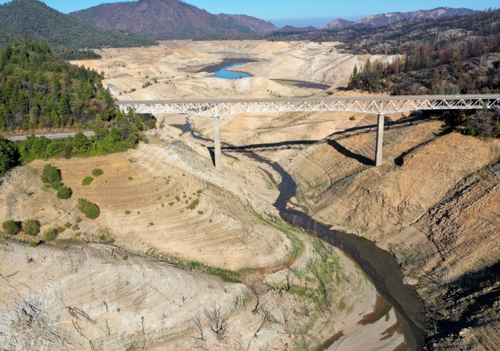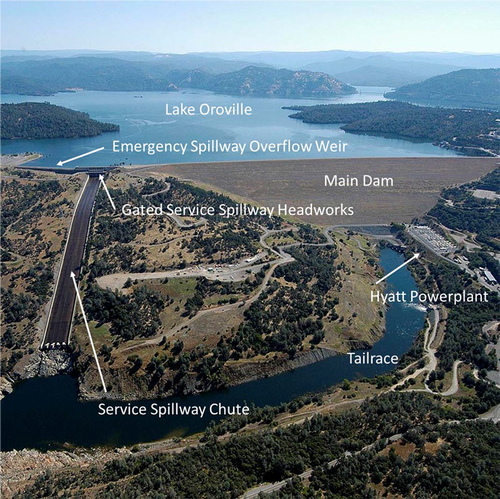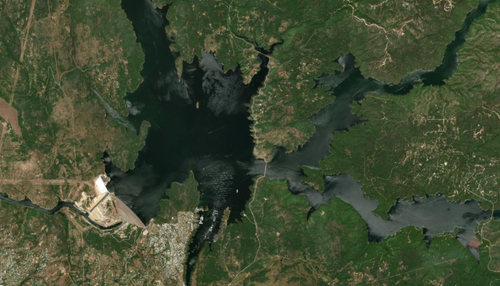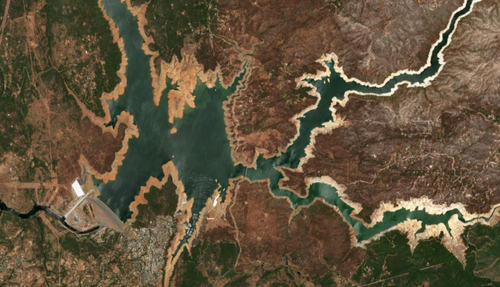Lake Oroville Hydro Power Plant Shut Down For First Time Due To Megadrought
One of California’s most important hydroelectric plants has ceased operations due to falling water levels, according to the Department of Water Resources (DWR).
On Wednesday, Lake Oroville fell to a record low of 642-feet above mean sea level. By Thursday, the lake stood at 641-feet above mean sea level. Readers may recall in mid-June, we said if the “640 feet is breached, then officials will likely be forced to close the Edward Hyatt Power Plant for the first time since it opened in 1967.”
Hitting the threshold was enough for DWR to declare the hydroelectric power plant had to cease operations. Lake management officials are in a water preservation emergency amid a megadrought and scorching heat waves.
Karla Nemeth, the director of DRW, said the move to shut down the powerplant follows a “climate-induced drought.”
Shutting down the plant is a move to conserve as much water in Lake Oroville as possible. Water in the lake is pumped into an adjacent hydroelectric energy facility known as the Hyatt power plant, which can power 800,000 homes when operational.
“DWR State Water Project operations managers have taken the Hyatt Powerplant at Lake Oroville offline due to falling lake levels. This is the first time Hyatt Powerplant has gone offline as a result of low lake levels. However, DWR anticipated this moment, and the state has planned for its loss in both water and grid management. We have been in regular communication about the status of Hyatt Powerplant with the California Independent Service Operator (CAISO) and the California Energy Commission and steps have been taken in anticipation of the loss of power generation.
“This is just one of many unprecedented impacts we are experiencing in California as a result of our climate-induced drought. California and much of the western part of the United States are experiencing the impacts of accelerated climate change including record-low reservoir levels due to dramatically reduced runoff this spring.
“DWR will continue to focus on reservoir operations and water storage management at Lake Oroville to preserve as much water in storage as possible. DWR will use the River Valve Outlet System to release some water from the base of Oroville Dam to maintain river temperature requirements and outflows to the Feather River.
“Falling reservoir levels are another example of why it is so critical that all Californians conserve water. We are calling on everyone to take action now to reduce water use by 15 percent, to preserve as much water supply in storage as possible should we experience another dry year. We are all in this together.” – Nemeth
The loss of the Hyatt power plant might not trigger blackouts but illustrates a broader challenge facing the state’s power grid operators this year amid multiple climate disasters.
Before & After
2019 Lake Oroville
2021 Lake Oroville
The power will have to be made up somewhere else to reduce the risk of blackouts:
“This is a huge problem. It’s part of the big challenge we are facing this summer,” Severin Borenstein, co-director of the Energy Institute at the Haas School of Business at UC Berkeley, told The Mercury News.
The silver lining is that Oroville won’t experience a spillover crisis anytime soon as drought ravages the region. Nevertheless, the federal government could quickly declare the first-ever water shortage in the area, which would prompt cutbacks in water usage.
Tyler Durden
Fri, 08/06/2021 – 18:00
via ZeroHedge News https://ift.tt/2VnIYml Tyler Durden



